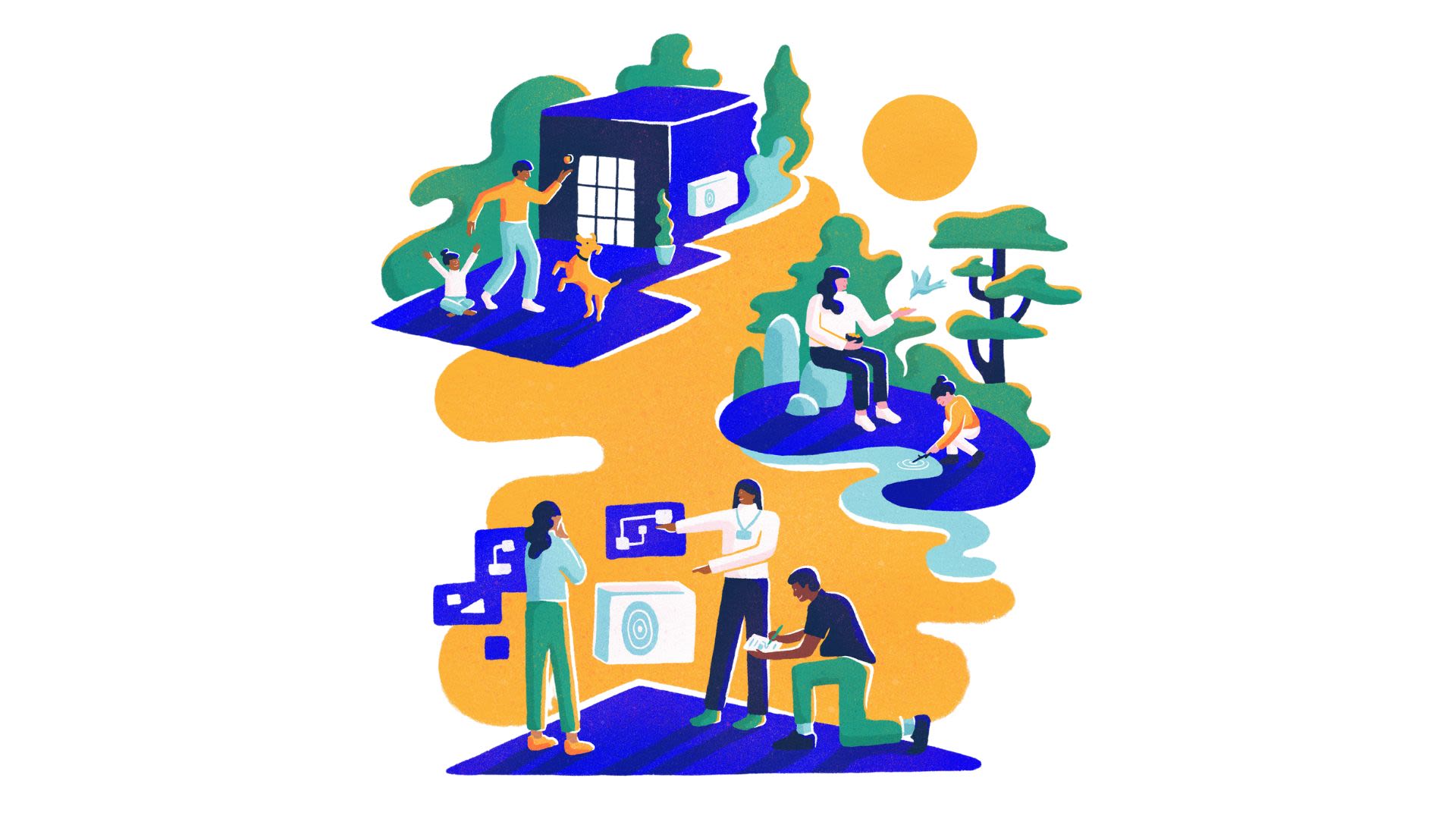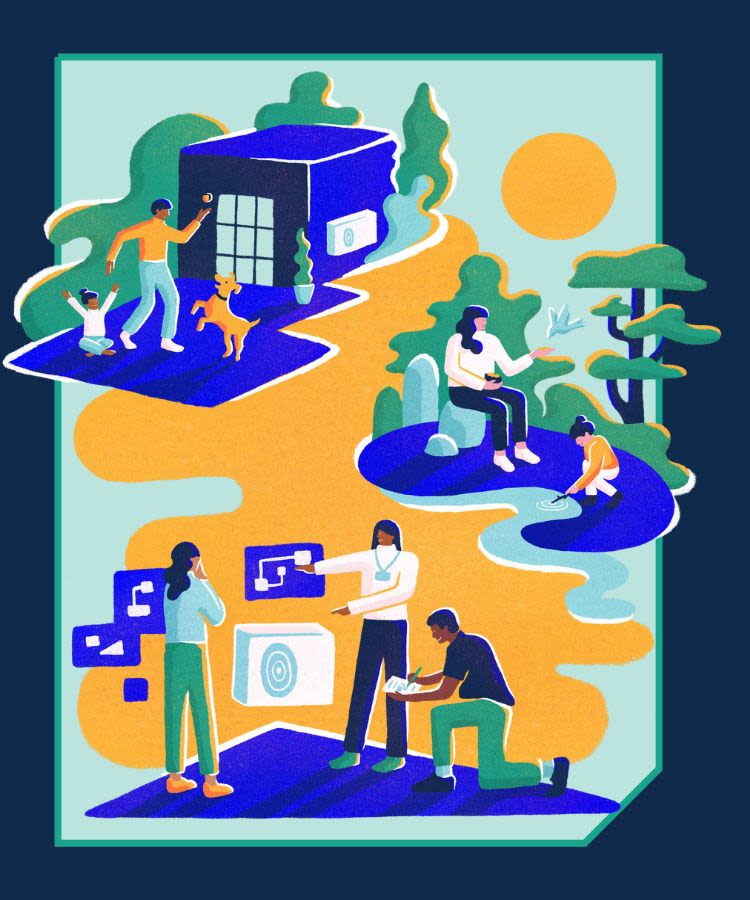Nesta's strategy
to 2030
2025 update

Introduction
Ravi Gurumurthy,
Group Chief Executive Officer
In 2021 we set out to address some of society’s biggest challenges through three missions that aim to give children a fairer start by age five, to halve obesity in the UK, and to drastically reduce home carbon emissions. This was a big shift for Nesta. We moved from being an enabler and promoter of innovation to being an active agent of change, seeking to identify innovative solutions and take them to scale through broad coalitions.
We’re now increasingly confident in our approach. While there is a long way to go, and much that is beyond our control, we are seeing real promise across all three missions. Therefore, this update on our strategy is an evolution, not a wholesale change. The core ambition and approach we set out in 2021 remains the same. However, by learning from our successes and failures over the past few years and acknowledging the ways the world has changed, we’ve identified three priorities moving forward, which are:
- To put even more weight into our missions
- To deepen our policy work
- To tool up for scaling
Our reasons for optimism
When we launched our three missions in 2021, we knew that progress on these complex, systematic challenges wouldn’t be linear. Obesity prevalence and disparities in early childhood development remain stubbornly persistent, and progress on home decarbonisation remains too slow to meet national targets.
Even so, we see reasons for optimism in three areas.

Policy environment
In recent years, we’ve seen encouraging shifts in public opinion and policy in our mission areas. Prevention in healthcare is now widely recognised as vital, with growing support for early interventions to reduce long-term costs and improve outcomes. In planning, political momentum is building to address long-standing barriers, unlocking sustainable development and infrastructure improvements critical to decarbonisation. These shifts suggest that transformative policy change may increasingly be within reach.
At the same time, the political environment has been turbulent, with four prime ministers since 2021. This churn has made consistent policymaking a challenge, but there are now signs of stability. The new UK government has placed missions at the heart of its agenda, signalling a longer-term commitment to innovation and experimentation. While its missions differ from Nesta’s, there is clear overlap in focus areas, creating fresh opportunities for collaboration and impact.
Adoption of new technologies
Technological advances have potential to accelerate progress across our missions. The emergence of GLP-1 drugs, such as Ozempic, offers a potentially viable - albeit costly - treatment route to halving obesity. Older technologies, such as smart meters, are scaling up, enabling innovative approaches to demand management and household decarbonisation.
More generally, we are climbing the S-curve of technological adoption, where rapid advancements and falling costs unlock transformative possibilities. For example, the declining costs of low-carbon technologies are making sustainable options more accessible, while generative AI could revolutionise early years education by enhancing parent-child interactions and improving the efficiency of practitioners. As these technologies mature, they open up new ways to tackle social challenges at scale.
Growing use of innovative methods
The way big social issues are addressed is evolving. Governments, local authorities and other organisations are increasingly adopting powerful techniques such as challenge prizes, collective intelligence, rapid evaluation methods and behavioural science. Applying new methods to entrenched challenges opens up more opportunities for impact.
At Nesta, we’ve brought together and refined a wide range of innovation methods through our teams at BIT, Challenge Works, and the Centre for Collective Intelligence Design, applying them in partnership with others to tackle complex challenges. One example of how government is increasingly embracing these approaches is the Cabinet Office’s Test, Learn and Grow programme, which is deploying multidisciplinary teams of designers, analysts, developers and behavioural scientists to take on public service reform challenges across the UK.
What does
Nesta do?
We are the UK’s innovation agency for social good. We design, test and scale new solutions to society’s biggest problems, changing millions of lives for the better.
For more than two decades we have worked to support, encourage and inspire innovation that benefits society, a purpose that is more relevant now than ever.

Our vision
By 2030 Nesta will have significantly improved the lives of millions of people. Combining rigour and creativity, we will be a world leader in driving innovation for social good.
We will pursue three innovation missions.
Each mission is a response to a generational societal challenge, one where we believe innovation has a big part to play in driving large-scale change.
We will set bold goals for our missions that may seem unrealistically ambitious, but which we hope will act as a lodestar that lifts our sight.

Our missions
A fairer start
A healthy life
A sustainable future
What we want to achieve
Our missions
To achieve our vision of significantly improving the lives of millions of people, we’re doubling down on our three 2030 missions: to give every child the same chance of developing to their full potential, to halve obesity, and to cut household emissions by 30%. These missions address entrenched societal challenges and demand bold, innovative solutions.
Three years in, we remain confident that each of these issues is fundamentally tractable. We’ve already achieved significant milestones that validate that our approach and resources can make a difference. And, informed by several years of practical experiments and research, we have a clearer view of the path to 2030 – one that recognises that although highly ambitious, each mission is achievable.

Our game plans to 2030

A fairer start
Our mission is that from 2030 every child has the same chance of developing to their full potential in the early years
The Prime Minister recently set the ambitious goal of raising the proportion of children reaching a good level of development from 67.7% to 75% by 2028. While this target is a galvanising force for action that we should leverage, we must ensure that it is achieved within the context of improving the outcomes of all children, regardless of family background.
To see these changes happen by 2030, some big policy shifts must occur within this Parliament. We will continue to advocate for a strengthened policy framework and increased spending, with a focus on joining up services to support families with young children, creating enabling conditions for the scaling of effective parenting support, and leveraging the substantial investment in early education and childcare to drive quality provision for disadvantaged children in particular.
But these policy changes will not be enough without effective implementation. The next step for us will be to ramp up our strategic partnerships with intervention developers, delivery partners, and local and devolved governments to scale good practice where it already exists. Where it doesn’t, we will test and learn our way to new solutions on the ground that have the potential to scale.
A healthy life
Our mission is to halve the prevalence of obesity in the UK by 2030
To halve obesity by 2030 we need to see changes in the food environment by 2029 as weight change is a slow process. That means key policy shifts must be in serious discussion by 2027. We believe this can be done in a way that benefits both public health and businesses, and over the next few years our focus is on proving that change is possible.
We’ve already synthesised the best available evidence in our Blueprint for halving obesity - we broadly know what needs to happen. The next step is scaling up our partnerships with retailers, producers, restaurants and local and devolved governments to trial and test these changes in real-world settings. By piloting these interventions, we want to demonstrate that significant improvements in diet are possible without major downsides for industry or consumers. This evidence will help ensure that policy is designed in a way that delivers maximum health benefits with minimal disruption to business, while keeping food enjoyable and accessible.
By 2027 we want to have built an undeniable case for action, giving policymakers, industry leaders and the public the confidence that a healthier food system is not only necessary but achievable.
A sustainable future
Our mission is to reduce home carbon emissions in the UK by 30% by 2030
Our best chance of achieving the 2030 mission is through helping develop and scale up initiatives, policies and services that rapidly increase uptake of low-carbon heating.
Specifically, we want to make it more attractive, easier and more affordable for homes to switch to heat pumps and other low-carbon technologies, ensure the policy environment supports and incentivises this shift, and help grow the range of solutions and supply chain to deliver them.
Heat pumps currently make up around 3% of new heating installations each year. By 2030, heat pumps and other low-carbon solutions need to form 50% of all new installations to meet climate goals. Making a shift of this magnitude requires ambitious policies, as well as a rapid shift in public attitudes and the attractiveness of heat pumps and other low-carbon heating solutions as a consumer proposition.
Through our practical innovation work with partners, and our ventures and investment activity, we aim to show how heat pumps and other low-carbon solutions can become affordable and appealing to households whatever their circumstances - for example, by testing how innovative tariffs can reduce heat pump running costs, or finding ways to support homes across entire neighbourhoods to switch to low-carbon heating together. We will continue to work with installers and industry more widely to design and test ways to grow a skilled workforce and support those already in the industry to make the shift to low-carbon heating.
We will use insights from our innovation work to shape policy advice to governments in the UK and devolved nations and work actively alongside officials and politicians to support policy development. We will grow our public-facing work, based on a more detailed understanding of what might motivate different consumer groups to adopt low-carbon heating - through doing this we hope to directly support uptake and create an environment in which politicians feel confident to act.
How we'll achieve
our strategy
We will continue to work across all stages of the innovation lifecycle: designing new solutions, testing their effectiveness, and driving for impact at scale. Each phase presents unique challenges to overcome.

Our roles
Nesta will play three complementary roles: working as an innovation partner, a venture builder and a system shaper. We defined these roles in 2021 and have updated them based on learnings from the last few years.
Innovation partner
As an innovation partner, Nesta works with partners in the public, private and voluntary sectors to design, test and scale new solutions. These could be interventions, products or services.
We begin by seeking to understand the problems we’re trying to tackle. We work closely with people directly affected by those problems and frontline practitioners to ensure we understand the problems and what drives them. Through collaboration with delivery partners, we generate ideas and co-create solutions, leveraging our interdisciplinary teams of designers, behavioural scientists, data scientists and researchers. And by drawing on the best available evidence, we identify proven approaches that could be adopted at scale. Our partners’ professional expertise, access to people and data, and deep knowledge of the system, ensure that solutions are well-grounded in the realities of delivery.
We test ideas and solutions with stage-appropriate rigour, dropping those with insufficient potential for impact at scale and refining the most promising. We design for scale from the start by bringing in potential scaling partners early, addressing each actor’s constraints and incentives, developing models that are easy to replicate across relevant contexts, and intentionally generating proof-points that help make the case for larger-scale changes in policy and practice.
To date we have partnered with companies, local authorities, universities and sector leaders, including the Food Foundation and Green Finance Institute, to tackle challenges across all three missions. For example, we have worked with the Art Fund to pilot Mini Wonders, a fun and engaging programme promoting positive interactions between parents/caregivers and their children aged 2-4 years old; with sector-leading energy providers such as Octopus Energy and E.ON Next to launch the Money Saving Boiler Challenge; and with Starbucks to identify factors influencing healthy food access and consumption in the out of home sector .
Venture builder
Sometimes innovation requires a more radical departure from existing practice than is likely to be possible within large institutions. New and early-stage ventures have significant freedom to innovate, often drawing on cutting-edge technological developments. The commercial market then acts as a fitness mechanism, forcing ventures to iterate towards products and services for which there is significant demand. A combination of capital injections, reinvestment of revenue in growth, and an existential incentive to get the innovation in the hands of users can then generate an accelerated path to scale.
As a venture builder Nesta seeks to create new ventures from scratch and help existing early-stage ventures to succeed, in service of our missions. Mission Studio works hand-in-hand with entrepreneurs to design and launch scalable tech start-ups with potential to make a meaningful dent in one or more of our missions, drawing on Nesta’s capabilities, knowledge and networks. Nesta Impact Investments supports established early-stage ventures to achieve their impact objectives and potentially shift key markets.
Since 2021 we have spun out nine new start-ups and invested in 16 early-stage companies to directly further our missions and create enabling market conditions for them to succeed. Our spinouts include Furbnow, who are enabling energy-efficient home retrofits across the UK, Martee AI, whose pilot has shown that through better demand forecasting they can help SMEs stock healthier food with a shorter shelf life and save them money, and Mealia, who are helping families seamlessly plan healthy meals and get the ingredients delivered to their door. Our investments include Aira, who are supporting thousands of homes to install heat pumps, and Mixergy.
System shaper
Innovations can thrive or die because of how the system around them functions. Politics, regulation and economic incentives all influence whether promising approaches gain traction, while public attitudes can drive the adoption of promising technologies, such as heat pumps, or inhibit them. Influencing systems is challenging but often necessary to achieve change at sufficient scale.
As a system shaper, Nesta seeks to understand relevant systems for each mission and identify key points of leverage within them. We seek to shape policy, regulation and incentives, primarily through direct engagement with policymakers and other decision-makers. We bring new ideas and perspectives to tired debates and advocate for evidence-based solutions. Our proposals are firmly rooted in our experimental research and work on the ground as an innovation partner and venture builder. This differentiates our proposals, ensuring that theory ultimately works in practice, while Nesta’s unique cross-sector position and convening power ensure proposals are informed by and relevant to different parts of the system.
We also aim to shift social norms and attitudes, in order to change behaviours directly and build a supportive environment for political or regulatory change. We do this, for example, by supporting mission-critical campaigns, convening and mobilising other actors, and using creative ways to tell stories that reach large audiences, including through the transformative power of the arts.
To date we have: shaped clean heat policy through detailed modelling that has informed the UK government’s approach; informed media narratives on sustainability through the Greener Homes Catalyst Fund, worked with broadcasters to bring stories of low-carbon living to millions of homes through mainstream TV; and supported ShareAction’s work with institutional investors to advocate for healthier practices within large corporations that shape our food system.
Culture and
inclusion at Nesta
At Nesta, we know that achieving bold, long-term missions depends on the people driving them. That’s why we’ve been intentional about shaping a culture that brings out the best in all of us—one that’s ambitious, outward-looking, experimental, and rooted in collaboration. We’ve also made equity, diversity and inclusion (EDI) a core part of how we operate, ensuring our missions create fairer outcomes and that everyone at Nesta feels they belong.
Join us
Whether you are a frontline practitioner, policymaker, private company or innovator, we are looking for partners, friends and collaborators to develop ideas, test them rigorously and scale what works.







